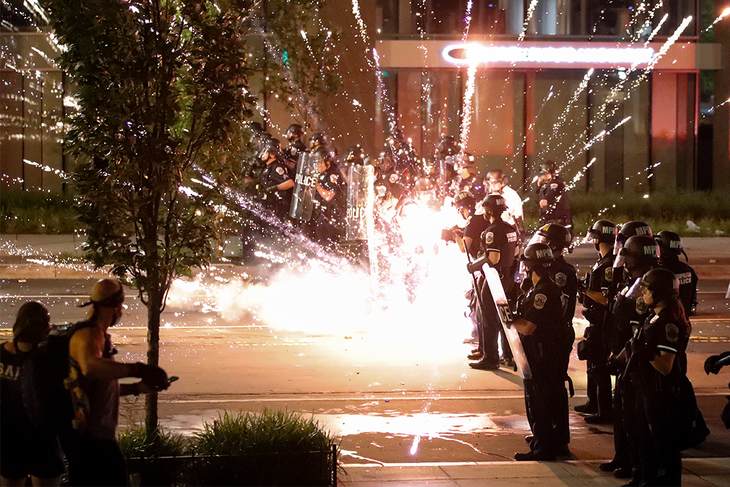Doesn't apply here.
DHS, Marshall's Service, Bureau of Prisons, FBI, CBP, GSA-FPS are not military.
They are not "THE MILITARY" i.e. they are not responsible for fighting wars, they are responsible for maintaining law and order based on "civllian laws".
However, they are aresponsible for homeland defence, anti terror and other quasi military and paramilitary activities within specific scopes such as "interior defence"
Generally the "civil authorities" are not engaged in combat actions HOWEVER, in some cases they are engaged in warfighting actions of a limited nature such as the DEA who are engaged in foreign policing, interdiction against "non state" parties.
The policing agents are responsible to the Attorney General while the President is the commander in Chief of the US military.
Police are not "US property" us service members are property of the United States. That is one of the only differences in that US service members are subject to the US military laws, and have to carry out their activities in concert with that or be subjected to courts martial.
Police are not subject to military law but they generally have "jurisidictions" and arrest powers.
Military generally only have authority over combatants.
Police powers come from civillian authorities IE the attorney general, while military powers come from the president.
The military is a tool to further US policy while police are suppose to be there to insure adherance to the justice system.
Both should ensure alignment with upholding the constitution and defending it. However, the military generally is there for when civil recourse cannot acheive national policy objectives. Federal police are "militarized" but the scope is more limited in nature and their goals are operational not for warfighting in foreign theatres. Forgoing limited partnerships and multinational operations that occur outside the US on a legal basis that facilitates for it in partnership with foreign partners. Generally federal police act within a limited scope of programs and operations aiming at combating "criminal activity" but federal forces generally have the aim of protecting american interests within the United States from criminal activity.
DHS is more about this
DHS is a unique creature and is not firmly military nor firmly policing. They are paramilitary interior defence forces. They are basically a standing national gaurd under federal control. Howeever they are not to my knowledge "subject to military law or an employment contract for a term of service" no veterans benefits etc..
Needs to be viewed as
PUBLIC SECURITY ACTIONS
VS
LAW ENFORCEMENT ACTIONS
not the same creature.
Public security is more or less about harm reduction through use of force if required while law enforcement is about ensuring rule of law through use of force if required. Law enforcement goes into the justice system.. public security might be through other federal code.
example
https://www.cdc.gov/phlp/docs/ph-emergencies.pdf
Emergency Federal Law Enforcement Assistance Act of 2006
42 U.S.C. § 10501, et seq.
"the Attorney General may
provide law enforcement assistance" in response to a governor’s
request. THey should be authorized under state
or local law to exercise the key law enforcement powers (arrest, search, seizure).
Bear in mind if they are acting without arrest, search or seizure, and only detaining.. the lawful detainment thing would need to be looked at.
re
arrest vs detention.
DHS arrest powers under CFR
https://www.law.cornell.edu/uscode/text/40/1315
In summary all that is required is for the agent to witness a federal crime while carrying out official duties.






